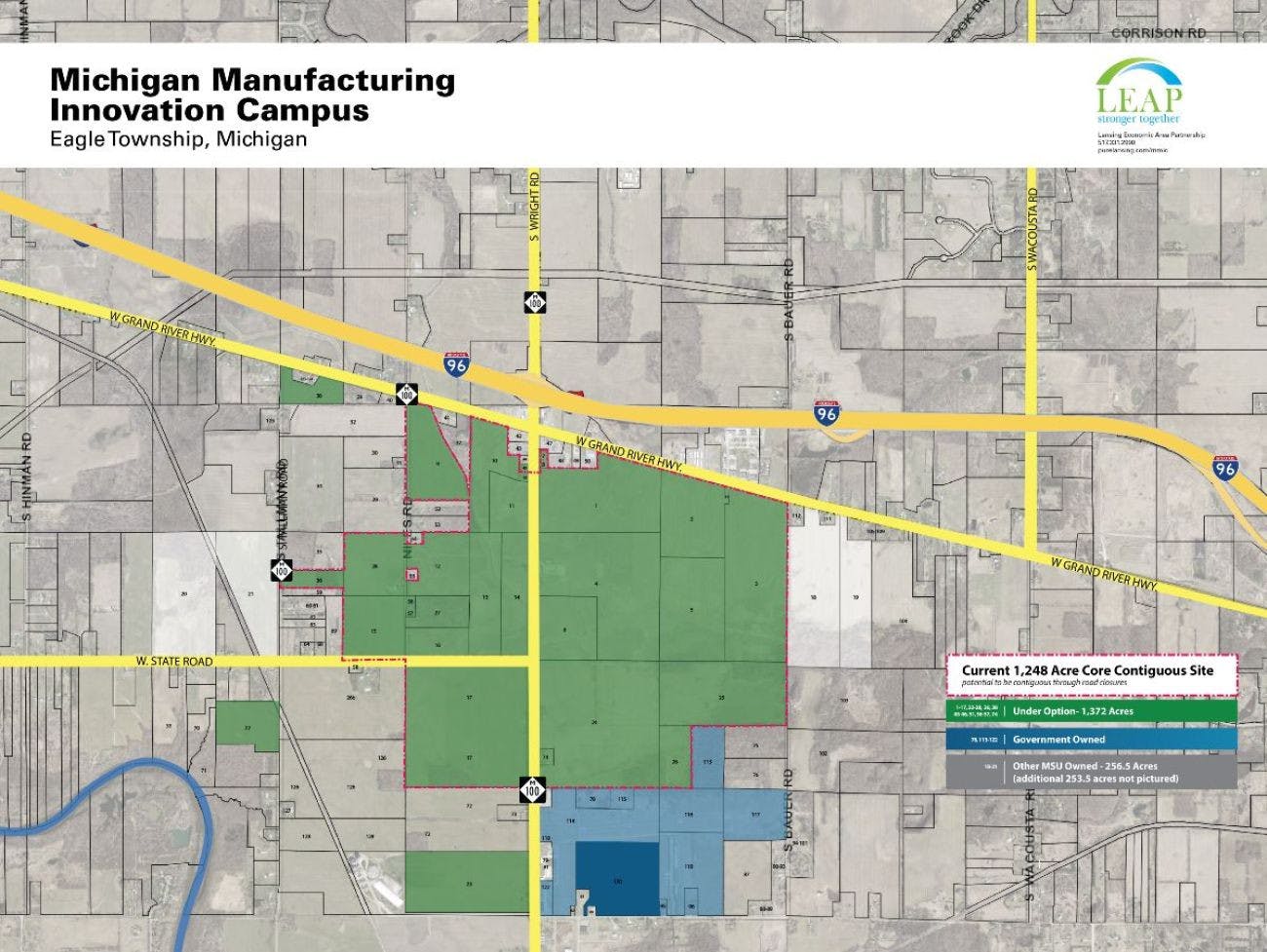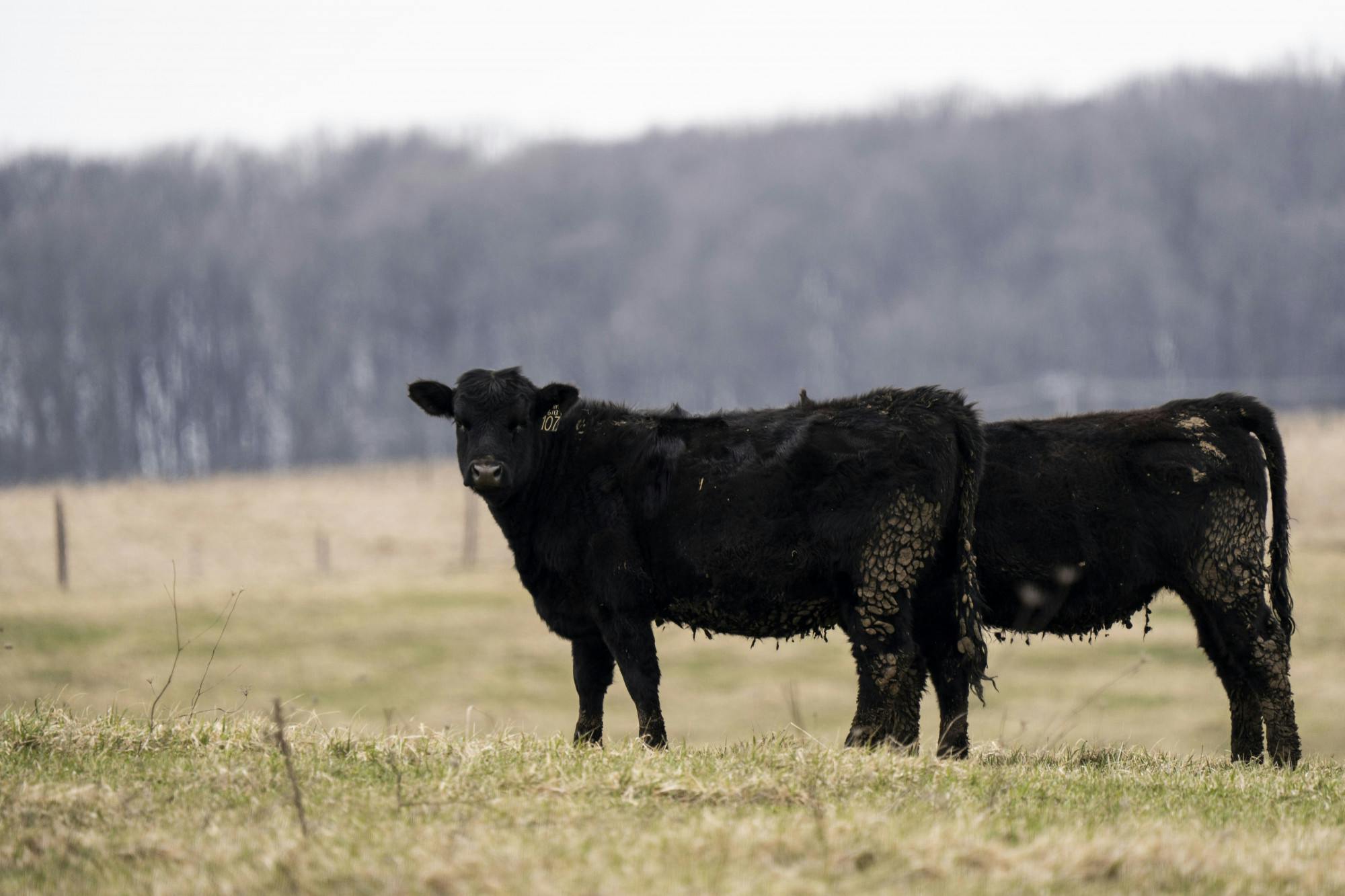MSU’s potential decision to sell its farmland in Eagle Township has been a source of controversy in the small community ever since residents became aware of the possibility a few months ago.
Now, residents fear their town will become the site of a "megasite," completely changing the area’s environment and life for residents.
Background on the land and crop agreement
MSU first received the land in 2005 as a gift from local farmer Dave Morris, who had a sizable portion of land in Eagle Township approximately 13 miles from campus. The gift included 1,400 acres and it required that the university maintain the crop lease for 25 years.
Morris’ terms stated that when the land is eventually sold, 55% of the proceeds from the sale would fund four endowments in the College of Agricultural Natural Resources and the other 45% would be allocated to the Clark Retirement Community in Grand Rapids.
The land is currently listed as agricultural land by the Clinton County Zoning Ordinance and it’s farmed by Clark Farms.
Potential decision to sell the land
Although the crop lease expires in 2031, MSU may plan to sell the land sooner. If the land is sold before then, the crop lease would transfer to the new owner who could work in partnership with the lease holder to determine the future of the agreement.
MSU deputy spokesperson Dan Olsen said he could not comment on or identify potential buyers at this time — or verify if MSU will even sell the land at all. Olsen said if MSU decides to sell the land, the university will continue to have conversations with the state of Michigan about the future of the property to ensure the decision will “support the economic vibrance of our state as well as the Greater Lansing region.”
Eagle Township Trustee Dennis Strahle said the possibility that MSU might sell the land was first presented to the township board in spring of 2022. He said the board was told a property might be for sale and that it could be sold to a buyer who wanted to turn it into a large construction facility. However, he said the board was not told any details regarding which property was being discussed or about potential buyers.
He said the board was asked to have Board Supervisor Patti Schafer sign a non-disclosure agreement, or NDA, that would give her the ability to participate in discussions about the property. Strahle said at the time, he thought this was the only way the township could have a seat at the table.
Strahle said in hindsight, agreeing to the NDA was not a good decision as it damaged trust between the board and the community once it came to light.

Community response
Resident Cori Feldpausch said she first heard that an alleged micro-chip factory was in the works in September through rumors. At the time, residents believed this was made-up because it was “ridiculous.”
“Why would anybody want to build a manufacturing site right here?” Feldpausch and her friends asked each other.
A month later, a Lansing State Journal article reported the alleged buyer had decided to go elsewhere, and according to Feldpausch, people breathed a sigh of relief. But then in November, an amendment to the Clinton County comprehensive plan was proposed — less than a year after the plan was passed.
The amendment said “at the request of Eagle Township, Clinton County is studying how to understand potential impacts from large-scale non-agricultural industrial/technological development.” The county had hired a firm to conduct the study.
Strahle said after this came to light, the once-empty township meetings were heavily attended by residents who were concerned about the possibilities of an alleged megasite being built.
Residents were upset for three primary reasons: They felt MSU selling the land early was a betrayal, they felt like their government had kept them in the dark and they were adamantly opposed to a megasite being built in their community.
Patty Morris Raymond, daughter of Morris and his wife Betty, said she is “deeply disappointed” in MSU. And since Eagle Township is small, many of the residents also personally knew Morris and feel similarly.
Feldpausch was neighbors with Morris, and she said if the land were to be sold, the decisions regarding the land would be “getting further and further away from anyone who ever knew David Morris and ever knew what he ever wanted.”
“Every single person that knew Dave knew that he would want his land left as something to do with agriculture,” Feldpausch said. “When he made that donation to Michigan State University, it was made in good faith to make sure that anything that is done there is farming related and I think he just trusted those that he worked with over at the college to make sure that would happen.”
Feldpausch is one of the admins for the “Stop the Mega Site” Facebook group, which has 1,970 members. One of the group’s active participants is Eagle Township resident George Bedard. Bedard said although he can’t speak for every resident, he believes that a large portion of the community feels “a lot of anger and a sense of betrayal on MSU’s part.”
“They champion themselves as a land grant college that looks out for farmers, and farmland, and farmer's interests, and selling this enormous farm … for profit so that a giant industry can be formed there seems like a betrayal to their mission and to the people of Eagle,” Bedard said.
As of March 3, 1,196 people have signed a petition against changing the land use map to ensure that the land remains agricultural. Many of these people are worried about the effects that a mega site would have on their town.
“This (land) is enormous,” Bedard said. “It's two square miles. I mean, it's the size of a city, and right now it’s all zoned agricultural. And once this is rezoned industrial, it will change the community forever.”
Residents fear if the rumors of a battery plant or micro-chip factory are true, the quiet, rural area would become loud and full of traffic, and that the environment would be destroyed from construction and chemical runoff. Feldpausch also said the schools don’t have the capacity for an increased population.
Bedard said residents are not “opposed to progress” and industry, but they believe old industrial sites should be revitalized instead of “destroying new farmland.”
Many residents also believe the alleged plan to build a megasite is corporate welfare at the state and possibly federal level.
“We're just a bunch of middle-class people,” Bedard said. “We don't have lawyers. We don't have marketing firms or consultants. We're just middle-class people all working hard, and so I think it's easy for these giant government organizations like (Michigan Economic Development Corporation) and (Lansing Economic Area Partnership) to come in to Eagle and bully us.”
The fact residents were also not told about the plans is adding further tension to the issue. Feldpausch said once residents became aware, they started telling Schafer “If no one wants this, it possibly cannot come.”
Feldpausch said they were told not to worry because nothing was coming. But this was confusing.
“Why would you open the amendment?” Feldpausch said. “Why would you want to change the land map usage? If nothing is coming, why would you do that?”
Feldpausch said in response, Schafer told them if something comes, then the township’s zoning will be prepared.
Feldpausch and other residents have been outspoken in their disapproval, calling politicians and speaking at MSU Board of Trustees meetings.
University response to backlash
MSU interim president Teresa Woodruff published a column in Michigan Farm News responding to the backlash on Jan. 31. Woodruff said the “four endowments that bear Betty and David Morris’ names will support Michigan agriculture for generations to come through programming in communities, agriculture and natural resources; through college discretionary funding; through livestock research; and through a named chair in state and local government finance and policy.”
Woodruff said she was aware that some were disappointed, since it’s “painful to see the landscape of our daily lives change and productive farmland is precious to our communities.”
However, Woodruff said MSU is honoring Morris’ vision through the endowments, which will advance Michigan agriculture and “carry forth our land-grant mission.”
“David Morris’ generous gift will empower us to continue that work for future generations. MSU will honor the wishes he clearly set forth for us, and it is his decisions that guide our actions,” Woodruff said.
Moving forward
It is still unclear whether or not the university will sell the land and what a potential buyer would do. In the meantime, the community’s focus is on preventing the rezoning at the county level. Once the outside firm completes its assessment, the county will make a decision.
Strahle hopes Eagle Township’s mission statement, which calls for the community’s development at “a reasonable growth rate” while still protecting “the varied natural resources of the Township’s land and its people,” will help deter the alleged megasite.
Although he is on the township board, he said he feels powerless in this decision because the board can only make a recommendation. He also said his motions to create an Eagle Township planning commission and zoning board were tabled.
Strahle plans to continue representing his constituents and prevent this megasite, which he said is like “putting a 1,000-foot Great Lakes Ocean freighter in the Red Cedar River.”







